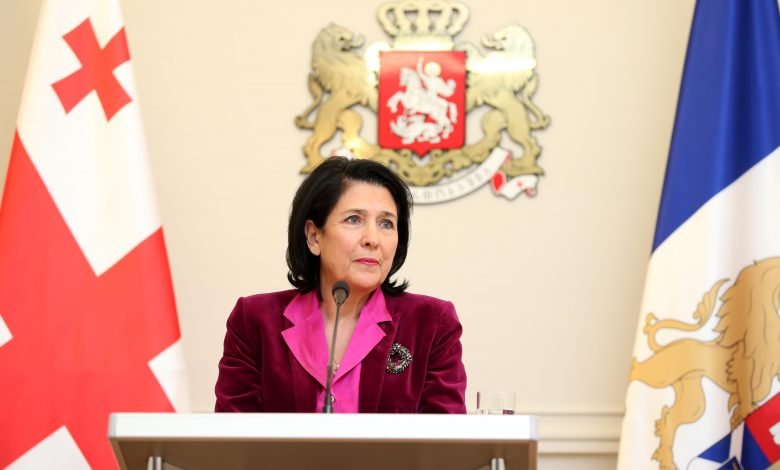
President OKs Dissolving State Inspector, Controversial Court Law Changes
President Salome Zurabishvili has signed off on controversial laws dissolving State Inspector’s Service and introducing sanctions on judges for violating the “principle of political neutrality,” defying opposition and civil society calls to veto the hastily adopted legislations.
She stated on January 13 that there were no “legal grounds” for her to send back to the Parliament the law abolishing the State Inspector’s Service and establishing separate entities for probing abuse of power and personal data protection.
“However I find it unacceptable to adopt such an important law in a fast-tracked process, without any consultations and appropriate discussion,” President Zurabishvili noted, adding that “the need to review [the bill] in an expedited manner was not justified with anything.”
The President stressed that it was a negative precedent that State Inspector Londa Toloraia – serving a six-year term – is being dismissed from her post “without any prior warning or argumentative remarks about her professional activities.”
According to President Zurabishvili, the aforementioned issue was especially problematic as bolstering the independence of officials remains a tough challenge for Georgia.
As per the law, the Inspector’s Service will be dissolved from March 1. Although employees and department heads will be transferred to either of the new agencies, the State Inspector and her deputies will be relieved from their duties.
“As a result of the adopted legislative changes an unfair situation arose,” the President commented, going on to express her hope that the Government will find a solution to allow Toloraia to continue working at one of the soon-to-be established bodies “with every guarantee of independence.”
President Zurabishvili argued that any decisions related to Toloraia will have an impact on the degree of independence of the rest of the employees as well.
Continuing about the controversial amendments to the Law on Common Courts, she stressed that there was an insufficient legal basis for her to return the legislation back to the legislature with motivated remarks in this case as well.
Nonetheless, the President highlighted that provisions included in the changes “raise certain questions.” President Zurabishvili named as one example lifting the ban on electing the same member of the High Council of Justice, the body overseeing Georgia’s judiciary, twice in a row.
She doubted that said change could improve the degree of independence of HCoJ members, but stressed that the “President cannot make a decision based on doubts.”
President Zurabishvili warned the Parliament about the risks the amended law contains and reminded the lawmakers that “the independence and impartiality of judges is the cornerstone of the development of our democracy.”
The Parliament adopted the controversial laws in an extraordinary session on December 30, triggering a public outcry and international criticism. The U.S. Embassy in Tbilisi said on January 3 that the ruling Georgian Dream party had undermined Government accountability with the move.
State Inspector’s Service, GYLA Head respond
The State Inspector’s Service issued a lengthy statement listing off the various circumstances surrounding the abolishment of the agency, highlighting that “there was an expectation that the Georgian President would on her part veto the law.”
It noted that although the Georgian Dream lawmakers had said they could overcome the veto, it would still have been an important move for the President to send the law back to the Parliament. This would have been crucial for Georgia’s democratic development and strengthening independent agencies, the Inspector’s Service argued.
Besides, the veto could have given the GD lawmakers another chance to possibly rethink going through with the controversial reform, according to the statement.
Head of Georgian Young Lawyers’ Association, Nika Simonishvili told Civil.ge that the President’s decision to refrain from veto was “absolutely baffling,” considering she had highlighted that she did not agree with certain aspects of the laws.
Simonishvili argued that the President’s move to sign off on the laws was inconsistent with the “national accord” process she kicked off in December. “By increasing the possibility of the Government interfering in the judiciary political polarization cannot be decreased,” he pointed out, adding “this decision by the President was a step back.
This article was updated at 20:03 with statements by the State Inspector’s Service and GYLA’s Nika Simonishvili.
Also Read:
- President Against Rushed Review of Bill Abolishing State Inspector
- Controversial Bill to Sanction Justices over ‘Unbalanced’ Opinions
- Georgian Dream Abolishes State Inspector’s Service
This post is also available in: ქართული Русский